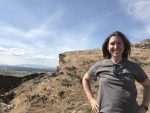
University of Oregon Assistant Professor Amanda Thomas is recognized for her important contributions to understanding episodic tremor and slip phenomena, the slow-earthquake rumblings that take place below the locked zones of faults.
“Combining seismology with a broad understanding of the physics of material deformation, Dr. Thomas has made seminal and fundamental contributions to understanding earthquake source properties, stress state and seismicity at plate boundaries,” said Nicholas Beeler of the U.S. Geological Survey, in his commendation for the award
In her nomination for the award, Thomas’ colleagues praised the breadth and depth of her original research and collaborations across multiple fields of geophysics, reflected in a substantial early-career publication record. In particular, she has conducted groundbreaking research on the mechanics of non-volcanic tremor and low-frequency earthquakes along the San Andreas fault zone in California and the Cascadia subduction thrust.
Her work along with her collaborators has provided some of the first comprehensive reports of the source properties of these events from the lower crust, going beyond documenting their occurrence to characterize the fundamental physics of the events and their possible relationship to seismic hazard, the nominators said.
More recently, Thomas, along with the Pacific Northwest Seismic Network, has led the seismic monitoring effort of the Rattlesnake Ridge landslide in Washington State. The ridge, which began collapsing in late 2017, is currently slow-moving; however, potential collapse threatens a small community and a major transportation corridor.
Along with heading up a thriving research lab, Thomas has been active in her position at the University of Oregon in lobbying state and federal officials to add 15 Transportable Array (temporary seismic stations) to the state and to support Oregon’s participation in a U.S. West Coast earthquake early warning program.
Thomas graduated with an honors B.S. in civil engineering from Georgia Tech in 2007 and received her Ph.D. in geophysics from the University of California, Berkeley in 2012, where she received the Berkeley Louderback Award from outstanding scholarship that same year.
